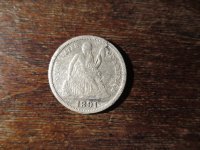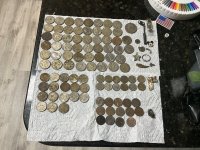northern_sierras
Jr. Member
- May 28, 2013
- 60
- 29
- Primary Interest:
- All Treasure Hunting
I backpacked to a remote area a couple days ago on a creek and found a mining claim with garbage strewn everywhere. There was about 1/8th of an acre with literally every kind of trash you can imagine - old sleeping bags, gas cans, thousands of food cans, etc etc and a highbanker setup. I called the forest service and was told that the owner has had the claim for over 3 years and has already been told to clean up the mess. Im wondering what actions can be taken to have his claim removed from his ownership. I feel the forest service is undermanned out here and is not fully capable of dealing with this type of thing due to the loss of funds from the active fire season out here in cali.
Upvote
0






 dirty rotten Yurok scam in accordance with the trinity river restoration even though claims are over 1,000' from the river,which they have spent 25 years tearing to pieces for 23 miles
dirty rotten Yurok scam in accordance with the trinity river restoration even though claims are over 1,000' from the river,which they have spent 25 years tearing to pieces for 23 miles John
John


